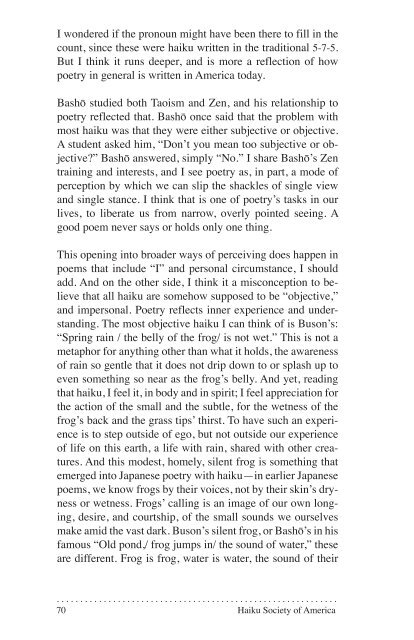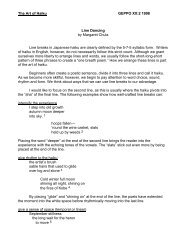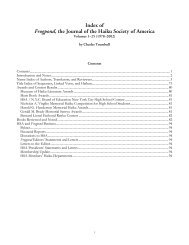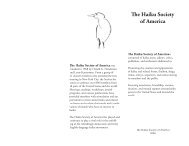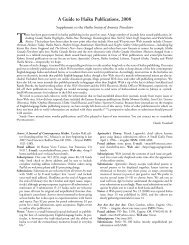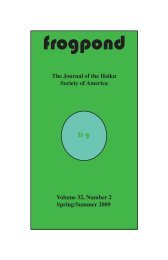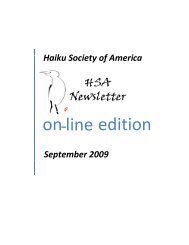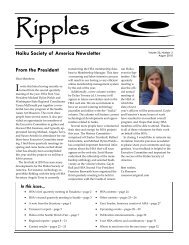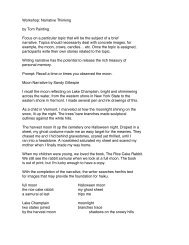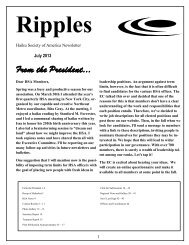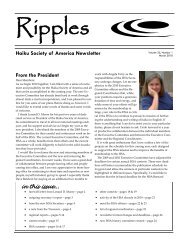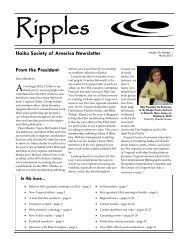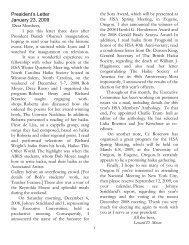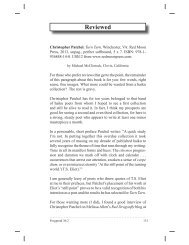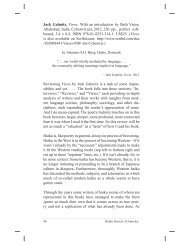Frogpond 34.3 • Autumn 2011 (pdf) - Haiku Society of America
Frogpond 34.3 • Autumn 2011 (pdf) - Haiku Society of America
Frogpond 34.3 • Autumn 2011 (pdf) - Haiku Society of America
Create successful ePaper yourself
Turn your PDF publications into a flip-book with our unique Google optimized e-Paper software.
I wondered if the pronoun might have been there to fill in the<br />
count, since these were haiku written in the traditional 5-7-5.<br />
But I think it runs deeper, and is more a reflection <strong>of</strong> how<br />
poetry in general is written in <strong>America</strong> today.<br />
Bashō studied both Taoism and Zen, and his relationship to<br />
poetry reflected that. Bashō once said that the problem with<br />
most haiku was that they were either subjective or objective.<br />
A student asked him, “Don’t you mean too subjective or objective?”<br />
Bashō answered, simply “No.” I share Bashō’s Zen<br />
training and interests, and I see poetry as, in part, a mode <strong>of</strong><br />
perception by which we can slip the shackles <strong>of</strong> single view<br />
and single stance. I think that is one <strong>of</strong> poetry’s tasks in our<br />
lives, to liberate us from narrow, overly pointed seeing. A<br />
good poem never says or holds only one thing.<br />
This opening into broader ways <strong>of</strong> perceiving does happen in<br />
poems that include “I” and personal circumstance, I should<br />
add. And on the other side, I think it a misconception to believe<br />
that all haiku are somehow supposed to be “objective,”<br />
and impersonal. Poetry reflects inner experience and understanding.<br />
The most objective haiku I can think <strong>of</strong> is Buson’s:<br />
“Spring rain / the belly <strong>of</strong> the frog/ is not wet.” This is not a<br />
metaphor for anything other than what it holds, the awareness<br />
<strong>of</strong> rain so gentle that it does not drip down to or splash up to<br />
even something so near as the frog’s belly. And yet, reading<br />
that haiku, I feel it, in body and in spirit; I feel appreciation for<br />
the action <strong>of</strong> the small and the subtle, for the wetness <strong>of</strong> the<br />
frog’s back and the grass tips’ thirst. To have such an experience<br />
is to step outside <strong>of</strong> ego, but not outside our experience<br />
<strong>of</strong> life on this earth, a life with rain, shared with other creatures.<br />
And this modest, homely, silent frog is something that<br />
emerged into Japanese poetry with haiku—in earlier Japanese<br />
poems, we know frogs by their voices, not by their skin’s dryness<br />
or wetness. Frogs’ calling is an image <strong>of</strong> our own longing,<br />
desire, and courtship, <strong>of</strong> the small sounds we ourselves<br />
make amid the vast dark. Buson’s silent frog, or Bashō’s in his<br />
famous “Old pond,/ frog jumps in/ the sound <strong>of</strong> water,” these<br />
are different. Frog is frog, water is water, the sound <strong>of</strong> their<br />
. . . . . . . . . . . . . . . . . . . . . . . . . . . . . . . . . . . . . . . . . . . . . . . . . . . . . . . . . . . .<br />
70 <strong>Haiku</strong> <strong>Society</strong> <strong>of</strong> <strong>America</strong>


